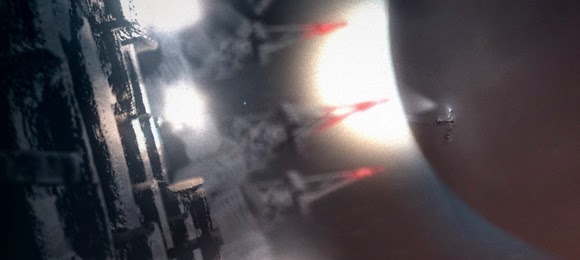I’ve just found a neat toy. Superficially it’s a strange-looking
gun – with seemingly no visual clues as to its nature. Curious. I pick it up
and pull the trigger expecting, as usual, some kind of interesting projectile.
But rather than bullets, it materialises a human figure. It’s me! An identical
copy – a clone. Surreal, I know. As I walk, he (it?) blindly mimics my action.
Hmm, so more of an empty vessel then than any kind of a real person. I shoot
again – my triplicate! Again – my quintuplet! I freestyle shooting up into the
air. Just as before another appears only this time he is falling. His feet hit
the floor first to an audible crack of bones. His limp body then collapses into
a heap, lifeless. Air from his ruptured spacesuit hisses out. I stare into the
middle distance. Suddenly I don’t feel quite so playful.
What I do feel is uncomfortably disturbed and that, to its
immense credit, is the feeling that The Swapper is able to evoke most vividly
during its short but captivating journey into the heart of darkness. Right from
the off, this unassuming piece hits you with the atmosphere – visuals that riff
off 2001 and sound design that recalls the nervy ambiance of alien. But that’s
just the introductory sequence. You then begin the lonely walk, first across
the haunted landscape of a forgotten planet, and later ascending to the empty
hulk of a ship haunted by some pitch black secrets.
As fast as the novelty passes you quickly become comfortable
with the mechanics of cloning yourself and ‘Swapping’ your consciousness
between bodies in order to traverse the environment. It’s a neat core mechanic
giving The Swapper a fresh, fluid, quality to its movement. Indeed, zipping
through the expansive habitats, crossing abyssal gorges and navigating labyrinthine
death traps, could almost be mistaken for a liberating if it wasn’t for one
uncomfortable necessity - Progression has never required such an unnatural
disregard for personal safety and over the course of the game you will
willingly sacrifice hundreds if not thousands of your cloned forms in order to
reach the ultimate conclusion. The trick Swapper pulls is in building your
familiarity with the mechanic of sacrificial progression without ever truly
answering the questions it raises regarding the soul.
Once this nervy backdrop is established Swapper starts
hitting a rhythm that somewhat recalls the majesty of the original portal - A
masterful build-up of complexity orchestrated with the deepening overture of
its narrative that makes for a rich, compelling symphony. New mechanics are
deftly introduced and then layered onto the ever multiplying permutations of
complex puzzle solving - The simultaneous clone limit, the gravity switches, the
very portal-esque red and blue light filters, composing the constituent parts
which are each time are combined in ever perplexing arrangements.
What this all adds up to is a well-crafted deftly told
science fiction short story. Not an extravaganza, not expansive world building,
but the evocation of a distinct journey against a mood of dread and isolation. While
Swapper succeeds on many technical and gameplay levels, the real magic of this
experience is one that harkens back to an unsettled feeling, that first
encounter with the swapper device itself and the sense of morose revelation as
its true nature becomes apparent. Some have said this could be the perfect
game. While I am hesitant to agree entirely, I can definitely see their
reasoning – engaging gameplay built on rock solid mechanics, rich absorbing
visuals and a feeling like standing on the edge of a dark precipice that
doesn’t quickly leave you. In truth – I don’t think it’s far off.





No comments:
Post a Comment